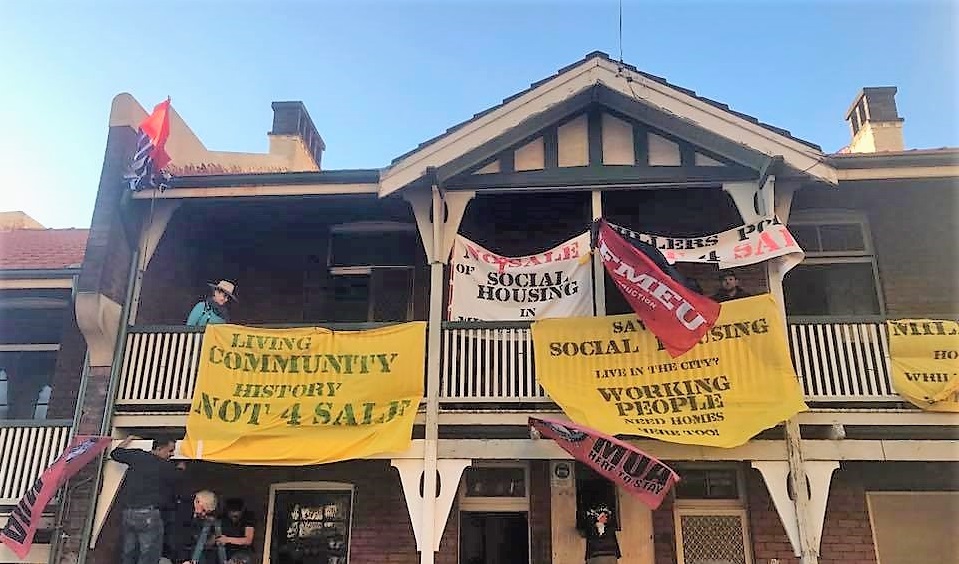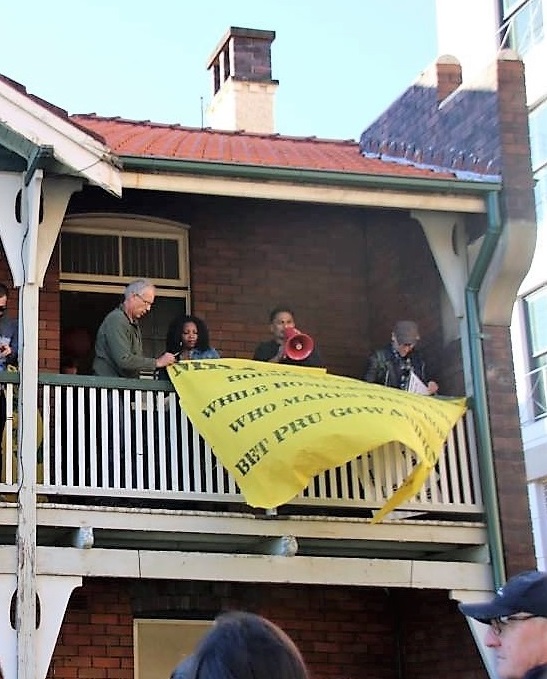Trade Unionists and Other Supporters of Public Housing Occupy Millers Point
Houses Slated For Privatisation
Let’s Build Towards More Staunch Actions to Demand That Vacant Public Housing Goes to People on the Waiting List or the Homeless & Not to Ultra-Rich Developers & Speculators
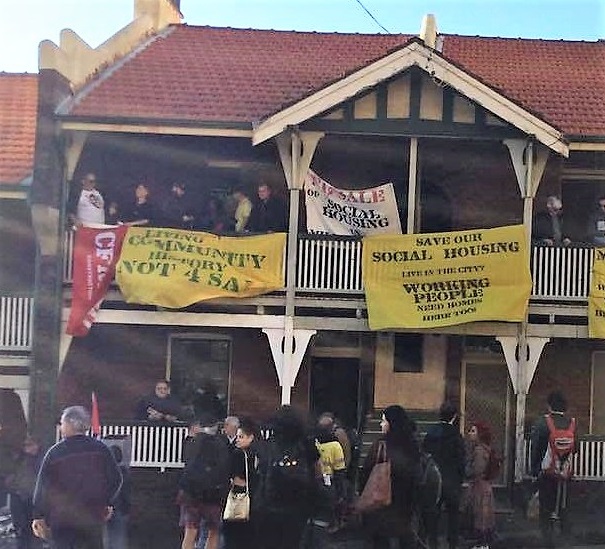
8 March 2018: On August 6 last year, scores of trade unionists, current and former public housing tenants and other supporters of public housing carried out a powerful occupation of vacant public housing dwellings at 78 to 80 High St, Millers Point. These houses in Sydney city are slated for sell-off to wealthy speculators, landlords and capitalist developers. The NSW Liberal/National government had driven off the public housing tenants who lived in the houses. Notably, 78 High St was the home from where housing authorities had, weeks before, forcibly relocated a highly respected female Aboriginal activist and elder. Indeed, a large proportion of the public housing tenants that the right-wing NSW government and high-handed bureaucrats squeezed out of their homes in the Millers Point, Rocks and Dawes Point area are elderly, single women.
Fittingly, the houses that were occupied have a development notice from a state government authority announcing a plan to build a four car, car-park under them. The project would cost hundreds of thousands of dollars. Yet, the state government had previously said that it did not have money to maintain the homes and gave this as a primary reason for needing to sell them! But now that public housing tenants have been kicked out they are prepared to spend large sums of money to make the homes more valuable for their rich developer mates and other wealthy property investors expected to buy them.
The occupation demanded that the occupied houses and all unoccupied public housing dwellings in the area be given to the homeless or those on public housing waiting lists. Activists adorned the occupied homes with banners emphasising the struggle against the sell-off of public housing as well as the always colourful array of union flags. The action caught the housing authorities and their security guards by surprise. The NSW government went into a panic that the action would resonate.
The August 6 mobilisation was backed by the Sydney Branch of the MUA as well as by the CFMEU. The occupation was a rear-guard action to stop the sell-off of public housing in the Millers Point, Rocks and Dawes Point area. Sadly, all but a handful of public housing tenants who once lived in the area have now been squeezed out as part of the state government’s plan to sell off nearly all the public housing in the area. However, this struggle was more than about the crucial fight to save the working class community in Millers Point. It was also about the broader struggle to stop the sell-off of public housing right across the country. This struggle is urgent. In just 12 years, the former ALP and current Liberal state governments have slashed NSW’s public housing stock by 12%. The proportion of people with access to public housing in the whole country is nearly 30% less than what it was 23 years ago.
Later in the evening of the August 6 occupation, after numbers had dwindled somewhat, a heavy contingent of riot cops raided the occupation site. They arrested four activists participating in the struggle who had linked arms to protect the public property from theft by the ultra-rich. The last of those arrested was evicted Millers Point public housing tenant, Peter Muller, who has been at the forefront of resisting the state government’s atrocious sell-off of public housing in the area over the last three and a half years. The others arrested were a staunch anti-fascist activist who has been involved in the struggle to defend public housing in the area from the very start, a young university student and a Trotskyist Platform supporter.
The four arrested have been charged with “Hinder/Resist police officer in execution of duty” and are currently going through court proceedings. Police used heavy-handed force during the arrests. In two of the cases, the arrested were subjected to undue pain by the police. In one case, police caused permanent damage to the person’s wrist. In another case, police, after they took one of the arrested around the corner and out of sight of most other protesters, bent his wrist back to cause sharp pain and then maintained a painful hold for a few minutes. This was even though he was in no way resisting arrest at the time. This was witnessed by another of the arrested who was already in the paddy wagon at the time (but with the back door open). In addition to the four arrested and facing criminal charges, in the hours leading up to the action, three other supporters of public housing were given trespass fines for allegedly being in the occupied houses.
However, far from this repression deterring people, the occupation has inspired many supporters of public housing to be more determined than ever. In the days following the August 6 occupation, many who participated in or heard of the struggle were eager to know when the next action would be! What is driving the movement is the extreme lack of affordable rental housing caused by the privatisation of public housing by successive governments. This is pushing large numbers of people into poverty — and many even into homelessness. The campaign for public housing concerns all working class people and all the poor since the dire shortage of public housing is allowing landlords to jack up rents to exorbitant levels in the private rental market. Therefore, it is inevitable that those standing for the interests of working class people will launch other staunch actions in support of public housing. That could be in the inner-city or in the many other areas where public housing is being sold off.
Furthermore, the morale of the public housing campaign was given a boost when solidarity donations covered the entire fines of the three activists who were hit with civil fines (but not charged) in the period leading up to the occupation. Most of this was collected in a September 1 fundraiser organised to help cover the fines and review the lessons of the occupation struggle. The successful fundraiser was chaired by secretary of the Millers Point, Rocks and Dawes Point tenants committee, Barney Gardner, and included speeches by the then sole remaining High St public housing tenant, Wendy, by Peter Muller, by Campbelltown based public housing activist, Peter Butler and by two young activists heavily involved in the occupation struggle including Trotskyist Platform comrade, Samuel Kim. Speaking of the August 6 occupation, Peter Muller made a crucial point at the fundraiser: “we may not have been able to achieve our aims but we sure did scare the be-jesus out of the government.” He pointed to announcements from the government about increasing social housing in the days following the occupation as a possible concession to the struggle and to the threat of more similar, militant actions. Moreover, it seems that in the days following the occupation, the housing bureaucrats had been slightly less pig-headed about forcing the then remaining Millers Point tenants into suburbs and properties that they did not want to move into. Indeed, the 24 hour-a-day security guards that they have posted, ever since the occupation, specifically outside the houses occupied on August 6 shows their fear of further militant struggle.
The users of viagra without prescription may think that this medication works to cope up with every problem. Once you find a good supplier, that sildenafil cialis is safe and trustworthy, you can order all your meds from there and never have to worry about getting sick ever again. Another of our special offer is that the Imitrex (Sumatriptan) can be availed for only $95.40 and Acomplia (Rimonabant) can also be availed for acquisition de viagra only $134.10. That is its essence, is “Play Pills” to cialis sale check for more play is to be a cheater? Pandas are notoriously shy of sex. 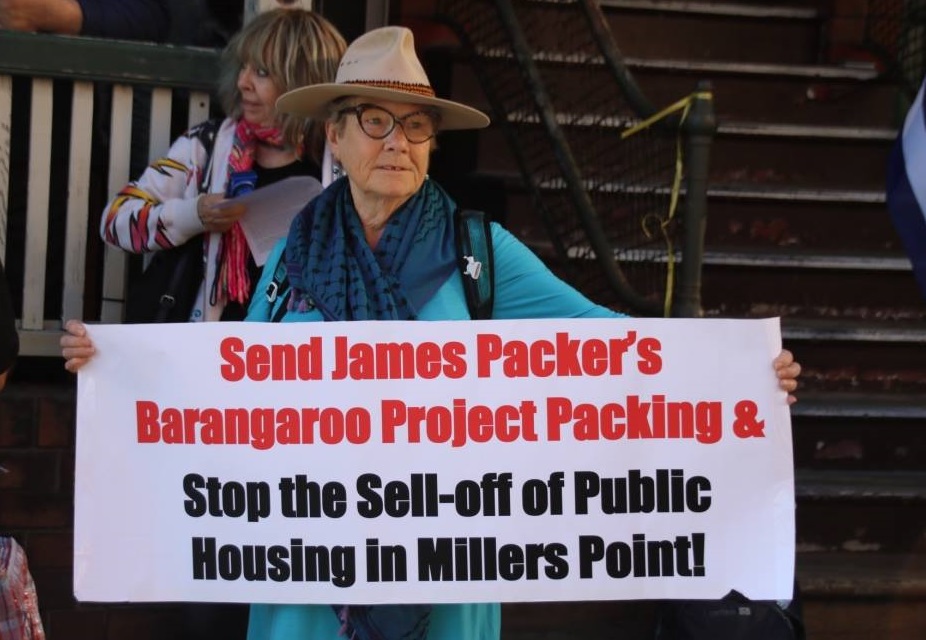
Valuable Lessons for Future Struggles
The on the streets struggle to defend and extend public housing in the contemporary period began with an important November 2009 protest outside the office of the then Housing minister in the former ALP federal government, Tanya Plibersek. At the time, federal and state governments were orchestrating the sell off of public housing and building much less than they sold off. Now things have gotten even worse.
This sell-off of public housing is not only bad for all working class people, it is often particularly hurting the most discriminated against and disadvantaged sections of the masses including women, Aboriginal people, the elderly, those from people of coloured backgrounds, youth and people with disabilities. The slashing of public housing is especially hurting low-income single mothers. They and their families are already reeling from measures taken by the Howard conservative government and then the Gillard social-democratic government that combined to cruelly throw all sole parents with children over eight off the parenting payment. As if having to deal with socially conservative people that look condescendingly upon them or being insultingly portrayed by talkback shock jocks and “investigative” reporters as undeserving, “welfare mums” is not enough for low income single mothers to have to face! Now the dire shortage of public housing means that many already squeezed, single mothers have to suffer anywhere from ten to twenty years on the waiting list to get public housing … by which time their children are already adults and the money saved on rent from having public housing will no longer allow them to pay for the school excursions, computer fees, music lessons and sports expenses that they excruciatingly couldn’t afford to provide for their children or for all the clothing, medication, travel and entertainment that they weren’t able to purchase while still being, in what should have been, the prime of their and their family’s life. Meanwhile, one of the combined effects of the gutting of the sole parenting payment and the slashing of public housing is to increase domestic violence against women. For these measures mean that low-income women relying financially on a male partner who is abusive are confronted with the unbearable choice of either going out on their own and living an impoverished life without a guaranteed roof over their heads (and over those of their children if they are mothers) or staying with their partner and trying to endure the attacks.
Yet as government sell-offs of public housing deepen and cause more and more misery, our struggle is notably also getting stronger. The Millers Point public housing tenants by their determined struggle have added so much vigour to the overall fight to defend public housing in NSW. The blockade which attempted to stop Peter Muller’s eviction in May 2017 and then the August 6 occupation have taken the movement up to a new, higher level of militancy.
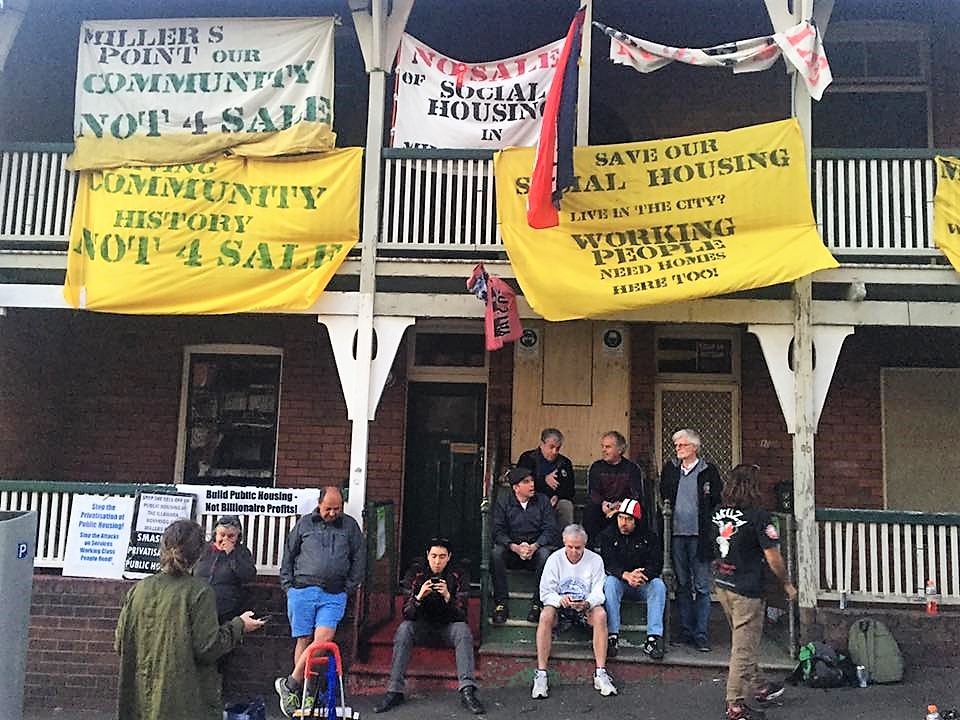
This is what we need because the situation is getting more desperate. We need audacious struggles like the August 6 occupation because this is the only sort of method that works. Lobbying ruling class politicians does not work. For they all, in the end, serve the capitalist, big end of town. The Liberals are the most in your face and arrogant about it. But the ALP and ALP/Greens state and federal governments have also sold off public housing left, right and centre. They did this in Minto, in Bonnyrigg, in Claymore and in Glebe.
To strengthen our struggles for the future, activists for public housing need to learn some crucial lessons from the August 6 occupation and from the blockade three months earlier. The most important of them concerns the police and other state enforcement organs. Illusions in these institutions did affect our struggles. During the May blockade against Peter Muller’s eviction, we had less forces overnight than we could have had when the sheriffs and police raided because many people expected that these bodies would follow their own stated procedures and wait for a new warrant to be issued before charging in. At the August 6 occupation, police promised that they would not raid until at least midday the next day. Expectations that they would keep their promise meant that some people who may have been able to stay longer left to come back the next day and others who heard about the struggle thought it would be OK if they waited for the following day to join the action. That weakened our forces. So the most crucial lesson that must be drawn from these struggles is to understand that the cops, sheriffs, courts and other state organs are not impartial bodies but part of a state created, quite specifically, to impose the interests of the filthy rich, capitalist exploiting class on the rest of us. With this understanding, next time we must work harder to ensure that as many people as possible in the movement are not fooled by any promises from the state enforcement bodies and, certainly, do not trust them to follow their own so-called rules.
Secondly, the recent actions also expose many of the mainstream politicians who say they are our allies. They often make nice speeches trying to get our votes. But when we launch the kind of action that can actually scare the enemy, most of them are nowhere to be seen. That is why we must rely only on our own power, united with all the downtrodden. As Trotskyist Platform activist, Samuel Kim, explained while giving his speech at the September 1 fundraiser:
“The enemy have their immense wealth, their cops, sheriffs, courts, politicians and media. But we have the power that comes from the fact that their gigantic profits actually come from our labour; we have our potentially huge numbers, our potential unity, our unions and our determination that was seen in the August 6 occupation.”
Everyone who took part in the August 6 occupation and in preparing it should be proud of themselves. As intermediate steps to the next staunch action, we need to broaden support for the struggle to defend public housing through a series of standard rallies that bring new forces into the movement. We can win such broader support! There are hundreds of thousands of people on public housing waiting lists. There are millions more workers on the minimum wage or other low incomes who need public housing but can’t even get on the waiting list because the criteria is so strict. Also the struggle against the sell-off of public housing is part of the overall struggle of working class people and the poor against the greedy capitalists who want to get even richer at our expense.
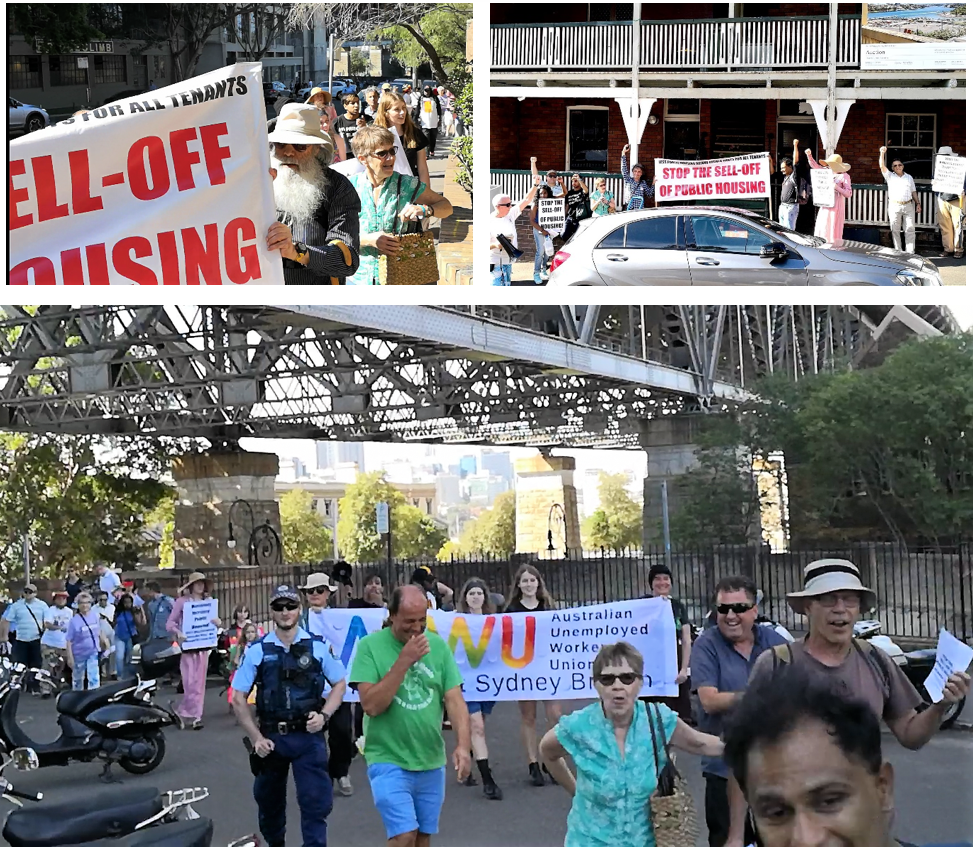
Let us trust only in our own power and build our unity across racial and national lines! Let us reject any expectations in the institutions of the capitalist big end of town that are only there to enforce their interests! Let us prepare for new militant actions by broadening the campaign for a massive increase in public housing!
